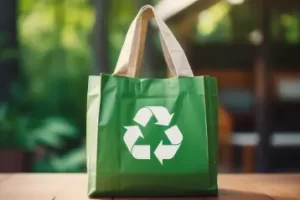Biodegradable garbage bags are an eco-friendly alternative to traditional plastic bags. They help reduce plastic waste and are designed to break down naturally. However, misusing them can reduce their benefits and lead to waste. Avoid these five common mistakes to make the most of biodegradable garbage bags.
1)Using Them For Heavy Waste
One of the biggest mistakes people make is assuming biodegradable garbage bags are as strong as regular plastic bags. While durable, they are not meant to carry heavy or sharp waste. Overloading them with heavy food scraps, broken glass or large amounts of liquid waste can cause them to tear or leak.
How To Avoid This Mistakes
- Use biodegradable bags for light to medium-weight waste.
- Avoid putting a sharp object inside, or wrap them in paper first.
- If you need to dispose of heavy bags, double the bags for extra support.
2)Storing Them Improperly
Unlike plastic bags, biodegradable garbage bags start breaking down when exposed to heat, moisture or sunlight. If stored in a warm or humid place, they may begin degrading before you even use them.
How To Avoid This Mistakes
- Store the bags in a cool, dry place away from direct sunlight.
- Keep them in their original packaging to protect them from moisture.
- Avoid keeping them in a car or near the kitchen sink, where humidity is high.
3)Throwing Them In Regular Trash
Many people assume that compostable garbage bags will break down anywhere. However, if they are thrown in a regular trash bin and sent to a landfill, they may not decompose properly due to a lack of oxygen and microbial activity in landfills.
How To Avoid This Mistakes
- Dispose of biodegradable bags in compost bins whenever possible.
- If your local waste system has a special biodegradable waste collection, use it.
- Avoid mixing them with regular plastic waste, as it defeats their purpose.
4)Using Them For Long Term Storage
Biodegradable garbage bags are designed to break down naturally over time. If you use them to store clothes, food, or other items for an extended period, they may weaken, tear or even start decomposing.
How To Avoid This Mistakes
- If you must use biodegradable bags for storage, check them frequently to ensure they remain intact.
- Use them only for short-term storage, such as collecting food scraps before composting.
5)Not Checking Certifications
Not all biodegradable garbage bags are truly eco-friendly. Some products claim to be biodegradable but contain plastic materials that take years to break down. Others may not meet composting standards.
How To Avoid This Mistakes
- Looking for certification labels like ASTM D6400, EN 13432 or BPI-certified compostable to ensure the bags meet environmental standards.
- Avoid misleading marketing terms like oxo-biodegradable as these bags may still leave microplastic waste behind.
Biodegradable garbage bags help reduce plastic waste, but you need to use them the right way to get the best results. Avoiding these five mistakes filling them with too much waste, storing them in the wrong place, throwing them in regular trash, using them for long-term storage and not checking if they are truly biodegradable. By using these bags correctly, you can help protect the environment and keep the planet clean and green!
Say No To Plastic, Switch To GreenTechPacks Biodegradable Garbage Bags!
FAQ
1)How long does it take for biodegradable garbage bags to decompose?
Biodegradable garbage bags take 3 to 6 months to decompose, depending on factors like temperature, moisture, and composting conditions. In landfills, they may take longer due to low oxygen levels.
2)What are biodegradable garbage bags made of?
Biodegradable garbage bags are made from natural materials like cornstarch, vegetable oils and plant-based polymers that break down easily in the environment.
3)How To make biodegradable garbage bags?
Biodegradable garbage bags are made by mixing plant-based materials like cornstarch with biodegradable resins.







